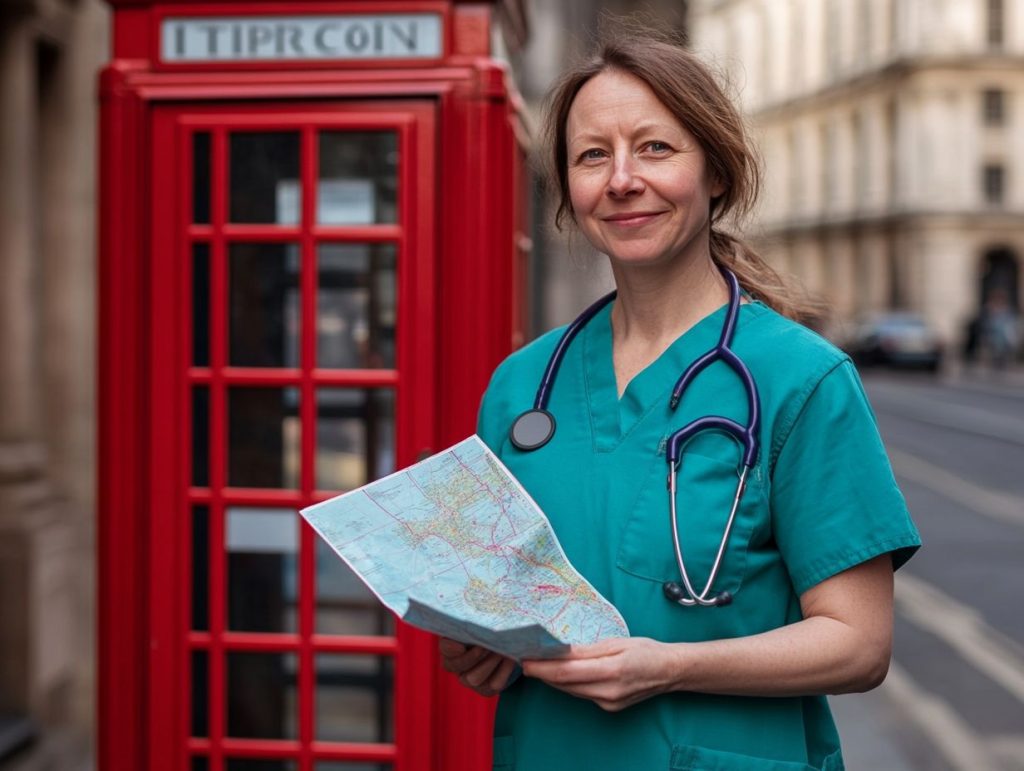Are you thinking of trading the Australian sun for the bustling streets of London as a nurse? This article shares insights from a seasoned Aussie travelling nurse and highlights the lessons learned.
From navigating culture shock and adjusting to the UK healthcare system to tips on job hunting and living in London, you’ll find valuable advice for a successful nursing career. Discover the challenges and rewards of nursing in one of the world’s most dynamic cities!
The Journey to Becoming a Nurse in London
Becoming a nurse in London is an exciting adventure with unique opportunities and challenges. As a travelling nurse, you will dive into new healthcare dynamics, explore a world of job options, and soak up the rich culture of the UK.
This journey means you must understand the nursing qualifications, registration process, and visa requirements. Embracing this change isn’t just about advancing your career; it’s also a chance for personal discovery in a vibrant new setting.
From Australia to the UK
Relocating from Australia to the UK as a nurse is quite the journey, with several steps to navigate, from sorting out visa requirements to getting to grips with the cultural differences in medical practice. You’ll discover that while Australian nursing qualifications are generally respected, you will still need to meet specific UK standards for registration.
This process can feel overwhelming, especially considering the emotional rollercoaster that a big move can trigger. You need to focus on practical tips, such as researching housing options and familiarising yourself with the local healthcare regulations.
Understanding the cultural differences in the workplace helps ease your transition. Adapting to different communication styles and patient interactions will build better rapport with everyone around you. Additionally, knowing about the relevant regulatory bodies, such as the Nursing and Midwifery Council, will help you comply with the necessary registration processes.
Cultivating resilience and adaptability will help you tackle the challenges and enrich your personal and professional growth in this new environment.
Adjusting to Nursing in London
Adjusting to nursing in London can feel like a rollercoaster ride—exciting but also a bit overwhelming as you get to know the UK healthcare system. You’ll need to adapt to different patient care protocols and tackle the unique nursing challenges of working in London.
It’s all part of the adventure!
Culture Shock and Differences in the Healthcare System
Experiencing culture shock is quite common for nurses like you moving to London, especially when you notice the differences in healthcare regulations and patient advocacy practices. Understanding these variations is critical to building solid professional relationships and ensuring effective patient care.
For example, you might be accustomed to a more standardised approach to patient care in Australia. However, in the UK, there’s a significant focus on individual patient advocacy and figuring out the ins and outs of the National Health Service (NHS). This shift can catch you off guard, particularly regarding communication protocols and patient involvement in decision-making processes. You’ll likely find that maintaining open communication lines with patients and healthcare teams is crucial for adapting effectively.
Embracing these differences helps you grow professionally and enhances the overall care experience for patients navigating the UK’s healthcare system.
Lessons Learned on the Job
Every nursing experience in London brings lessons, often shaped by the challenges you encounter in clinical practice.
Whether dealing with burnout or finding emotional support, grasping these lessons is crucial for your professional development and improving the care you provide to your patients.
Challenges and Rewards of Nursing in London
The nursing challenges in London, such as managing stress and adapting to a fast-paced environment, can feel daunting. But guess what? Those hurdles come with some serious job satisfaction and teamwork opportunities. Embracing these career transitions can lead to personal growth and some invaluable experiences.
You might find navigating long shifts, high patient-to-nurse ratios, and the emotional burden of patient care overwhelming. However, these challenges can also create great camaraderie among your colleagues.
For instance, during those particularly tough nights in the accident and emergency department, you will likely find yourself leaning on your fellow nurses for support, sharing a quick laugh or a moment of empathy that helps lighten the load. This collaboration strengthens your professional relationships and boosts the overall quality of care you provide.
Ultimately, tackling those obstacles together builds resilience and confidence, setting the stage for greater job satisfaction and a fulfilling career in this essential field.
Navigating the London Nursing Job Market
The London nursing job market thrives, offering plenty of job opportunities for local and international nurses. However, you must understand salary expectations, connect with recruitment agencies, and actively network to make the most of it.
Job Hunting Tips and Tricks
Job hunting in London as a nurse can be pretty competitive. Still, you can make an impact by using effective networking strategies and crafting a standout CV tailored for the UK healthcare sector.
Highlight your relevant qualifications and experience that align with what employers seek in this dynamic field. Getting involved with professional organisations and attending industry events can help you build invaluable connections and keep you informed about the latest job openings.
Don’t underestimate the power of social media; platforms such as LinkedIn can be game-changers for showcasing your expertise and connecting with hiring managers.
Remember, preparing for interviews is about more than just rehearsing common questions; understanding the values and culture of the organisations you apply to can set you apart from other candidates.
Living as a Travelling Nurse in London
Living as a travelling nurse in London offers a unique lifestyle that combines the thrill of exploring a new city with the challenge of managing expenses and maintaining a healthy work-life balance.
Understanding the cost of living, including accommodation and public transport, is essential to making the most of your experience.
Accommodations, Transportation, and Cost of Living
Any travelling nurse must find suitable accommodation and understand public transport in London. With living costs varying across different areas, you’ll want to choose a location that balances your budget and convenience.
This choice can shape your work experience and personal life since the availability of amenities and access to hospitals can vary significantly from one neighbourhood to another. For example, places like Clapham and Greenwich have lively communities but tend to have higher rental prices. On the other hand, neighbourhoods like Peckham and Woolwich might offer more budget-friendly housing options, helping to ease some of that financial pressure.
Additionally, you should consider the public transport networks. Most areas are well connected with buses, trains, and the Tube, making your daily commute straightforward. To keep living expenses down, exploring co-working spaces or shared accommodation can be a smart move. These often include utilities and can free up extra cash for leisure activities.
Advice for Aspiring Nurses in London
If you’re an aspiring nurse looking to thrive in London, engaging in professional development through mentorship and training programmes can boost your career.
Exploring different nursing specialities will enhance your skills and open up a world of job opportunities for you.
Tips for a Successful Nursing Career in London
To build a successful nursing career in London, you must prioritise continuing education and networking. This boosts your job security and contributes to your personal growth. Engaging with the nursing community keeps you in the loop on healthcare trends and helps you create valuable professional relationships.
By pursuing advanced qualifications and specialised training, you can develop new skills that are increasingly sought after in the ever-evolving healthcare landscape. Attending workshops and conferences enhances your knowledge and allows you to meet experienced professionals who can provide mentorship and guidance.
Getting involved in local nursing organisations and online forums helps you build a strong support system while establishing your reputation among your peers. These connections could lead to job opportunities and collaborations, giving you insights into best practices and innovations in patient care.…

